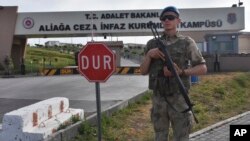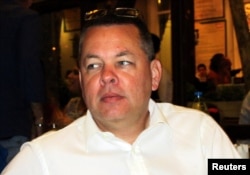A Turkish court ruled for the continued detention of an American pastor in the face of growing U.S. pressure for his release. Andrew Brunson faces 35 years behind bars on terrorism and espionage charges, in a case condemned by U.S. President Donald Trump.
The pastor's jailing is becoming the focal point of wider simmering U.S.-Turkish tensions. The U.S. State Department has labeled the charges "groundless and without credible evidence." Brunson's ongoing detention will likely add to growing calls in Washington for sanctions against Turkey, observers said.
In the second day of the pastor's trial Monday, a witness testifying anonymously via video link accused Brunson of helping the banned Kurdistan Workers Party, the PKK, to create a Christian Kurdish state. The PKK is a Marxist organization that has waged a decades-long insurgency for greater minority rights.
Brunson is also accused of supporting followers of the U.S.-based Turkish cleric Fethullah Gulen, blamed by prosecutors for a failed 2016 coup, a charge Gulen denies.
"Shameful and disgusting," Brunson said in court of the charges against him. The case was adjourned until July 18.
The U.S. embassy charge d'affaires, Philip Kosnett, and Sandra Jolley, vice chair of the U.S. Commission on International Religious Freedom, were at the hearing.
"Every day that Andrew Brunson spends here in prison is another day that the standing of the Turkish government diminishes in the eyes of not just the United States, but the entire world," Jolley said.
'Hostage diplomacy'
Brunson has been jailed since October 2016, mostly in solitary confinement. Concerns are growing over his health, with his family saying he has lost 25 kilograms (55 pounds).
The pastor's plight is increasingly drawing a reaction from Washington.
"They call him a spy, but I am more a spy than he is. Hopefully, he will be allowed to come home to his beautiful family where he belongs!" tweeted U.S. President Donald Trump last month after Brunson's first appearance in court.
"They [Washington] say, the government should release him. Is it up to me? This is a decision the judiciary will make," Turkish Foreign Minister Mevlut Cavusoglu said Sunday.
Ankara is facing growing accusations of engaging in "hostage diplomacy." Last month, U.S. Senator Thom Tillis said Brunson has become a "political pawn."
Analysts suggest Ankara could now be linking the Brunson case to the recent conviction of an executive of Turkey's State Halkbank. A New York court convicted Hakan Atilla of violating Iranian sanctions. He is due to be sentenced later this month. The Turkish government has condemned the case, claiming it was politically motivated and calling for his release.
President Recep Tayyip Erdogan and his ruling AKP are seeking re-election in June 24 polls. Their hard stance against Washington will likely play well with their nationalist and religious base, observers said.
"I bet on his [Brunson's] continued incarceration, which will raise the odds for sanctions," said political analyst Atilla Yesilada of Global Source Partners.
In a rare display of U.S. congressional unity, 66 Democrats and Republicans signed a joint letter calling for Brunson's release, and warning of unspecified measures against Ankara.
Economic fallout
Analysts said the Brunson case is exacerbating existing tensions between the two NATO allies. On Friday, U.S. Congress members called for a block on the sale of F-35 fighter planes because of Ankara's planned purchase of Russian S400 missiles.
"We understand that the U.S. government may consider imposing fines or other penalties on one or more Turkish financial institutions, including state-owned entities, and potentially companies in other sectors, for allegedly enabling Iranian counter parties to evade U.S. sanctions," read a statement last week by the credit rating agency S&P Global.
Analysts warn the prospect of U.S. sanctions could mean more financial pain for Turkey. International investors' concerns over growing political and economic risks continue to see the Turkish lira hit record lows.
"The Turkish story in the markets is already pretty pessimistic," economist Inan Demir of Nomura Securities said. "The exchange rate is perhaps the most important indicator of business and consumer sentiment."
But Ankara is pushing back. "The U.S. attempt to impose sanctions on us is illogical and wrong. I would retaliate [if it occurs]," Cavusoglu said Sunday.
Ankara believes it has a strong hand in its dealings with Washington. Ankara's deepening ties with Moscow remain a key point of concern within NATO.
"The bottom line for the United States is to stop Turkey falling entirely into the laps of the Russians," political scientist Cengiz Aktar said.
But Aktar warns Ankara is in danger of overplaying its hand.
"This way of abusing the geographical position [of Turkey], might backfire one day, especially if cost-benefit analysis shows one day that for Washington to keep Turkey as a partner is more costly than the benefits it draws," Aktar said.






